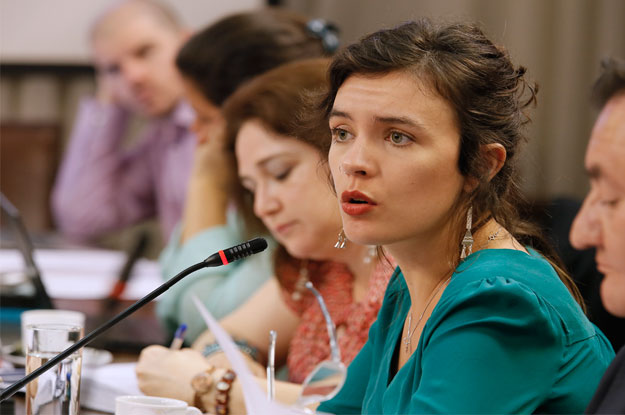As student leaders in 2011, they mobilized some of the largest protests Chile had ever seen. They frustrated authorities, inspired millions of young people and earned a fair share of international attention. In 2013, before the age of 30, they were elected to Congress in a national election that many considered proof of the Chilean left’s resurgence.
Now, two years later, Camila Vallejo, Giorgio Jackson, Gabriel Boric and Karol Cariola are learning just how hard it is to change the system from within. The reforms they demanded in the streets and promised as candidates – above all to the country’s education system – have been held up by disagreements over how they are to be achieved.
As the so-called bancada estudiantíl, or student caucus, they have found consensus hard to come by, a reminder of their time representing competing factions within university politics. While the Chilean and international media group the four deputies together, the reality of partisan politics has made such an association more or less irrelevant.
“Blaming a bancada estudiantíl for not being successful is a bit unfair since there isn’t a bancada estudiantíl,” Patricio Navia, an expert on Chilean politics who teaches at New York University, told AQ. “The four legislators got elected on three different coalitions – two of them in the New Majority, one as an independent, and the other on a different independent list.”
The group’s differences are plain to see. Independent deputy Boric accuses the government’s coalition – of which Vallejo and Cariola a part – of making too many concessions to business when it comes to education reform. The deputies also disagree on the role the state should play in a reformed education system.
Still, the four have the popular legitimacy to keep education reform high on the national agenda. Two of them, the Communist Party’s Camila Vallejo and Independent Giorgio Jackson, sit on the House of Deputies’ 11-member education committee. Vallejo, who as a nose-ringed 23-year-old was voted The Guardian’s “Person of the Year” in 2011, serves as the committee’s chair. The youngest deputy in Congress, she finds herself representing the president’s coalition in the halls of Congress, balancing the demands of Chilean students and the political needs of a president she once said she’d never campaign for.
“She finds herself in somewhat of a difficult position,” said Navia. “She’s influential and she has power, but she needs to see that the reforms move forward, and in politics that often means that you have to compromise, and I think that has been the [former student leaders’] biggest challenge.”
Vallejo and her fellow young deputies have been criticized by some established legislators for not compromising enough, with one opposition deputy denouncing their “all or nothing” approach. But the former activists haven’t shied away from promoting legislation that challenges the status quo and Chile’s political establishment.
One example is when Jackson and Boric, one month after taking office, proposed legislation that would freeze congressional salaries and tie them to the minimum wage, requiring any raise for congress members to be coupled with a hike in the minimum wage. While the proposal failed, “it represented the type of change that they were elected to bring about,” says Navia.
The biggest question that remains may be how Vallejo, Cariola, Boric and Jackson carry on their reform agenda after President Michelle Bachelet leaves office in 2017; the next presidential election may present an opportunity for the four to unite around a single candidate and direction for the country. As the country looks to a new generation to succeed the aging leaders that oversaw Chile’s transition to democracy, the notion of the bancada estudiantíl may yet prove a reality.








